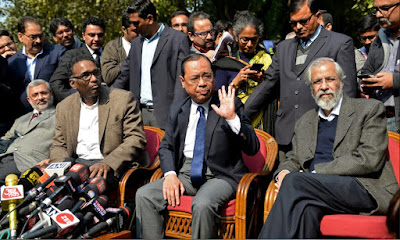Four justices call extraordinary press
conference to warn that bribery row has ‘far-reaching consequences’ for India
By Michael
Safi
 |
|
Justices
Kurian Joseph, Jasti Chelameswar, Ranjan Gogoi and Madan Lokur, seated,
address
the media at a news conference in Delhi. Photograph: Reuters
|
Four senior Indian supreme court judges have
gone public with an extraordinary warning that India’s chief justice is
mishandling sensitive cases and endangering the court’s integrity and the
country’s democracy.
The four judges, the most senior members of
the bench after the chief justice, abruptly left their courtrooms on Friday
morning and called the first press conference by members of the usually solemn
institution.
Led by judge Jasti Chelameswar, they
delivered an unprecedented message to the journalists gathered in Delhi: that
the conduct of India’s highest court was “not in order” and that “unless this
institution is preserved, democracy can’t be protected in this country”.
The revolt against the chief justice, Dipak
Misra, has been months in the making. It broke into the open in November, when
he was accused of mishandling a matter relating to a former judge alleged to
have offered to bribe members of the supreme court in a case Misra himself was
presiding over.
Misra has not been accused of taking bribes
but was fiercely criticised, including by senior lawyers, for repeatedly
intervening to ensure only judges of his choice could hear the matter.
One case cited by the four justices on Friday
was a request for an independent investigation into the death of judge BH Loya,
who was overseeing a case involving murder allegations against Amit Shah, a
leading figure in the ruling Bharatiya Janata party (BJP). Media reports in
recent months have raised suspicions over Loya’s death.
Though politically charged cases have
traditionally been overseen by the supreme court’s most senior judges, the
request for an independent investigation into Loya’s death was assigned by
Misra to a relatively junior member of the bench.
In a letter to Misra, which was released to
the media on Friday, the four judges said: “There have been instances where
cases having far-reaching consequences for the nation and the institution had
been assigned by the chief justice of this court selectively to the benches ‘of
their preference’ without any rationale for this assignment. This must be
guarded against at all costs.”
Asked by journalists if the chief justice
should be impeached, Chelameswar said: “Let the nation decide that.”
The judges were at pains not to accuse Misra
of any specific wrongdoing nor criticise any specific judgments. Rather, their
charge is that by breaking from the traditional procedures for allocating cases
– which heavily emphasise seniority – he is allowing what they called
“questions on the integrity of the institution” to fester.
Echoing criticism levelled at the court in
past months, the Indian Express published an article on Friday morning by a
senior lawyer, Dushyant Dave, highlighting instances where Misra had failed to
allocate the most senior judges available for sensitive cases.
“It is important for this institution to
ensure that an impression is not given to the public that the constitution of
benches and allocation of matters is being done in a manner more palatable to
the executive,” Dave wrote.
Chelameswar closed the dramatic press
conference by saying: “We don’t want wise men saying 20 years from now that
justice Chelameswar, [Ranjan] Gogoi, [Madan B] Lokur and Kurian Joseph sold
their souls and didn’t do the right thing by our constitution.”
Alok Kumar, a senior resident fellow at the
Vidhi Centre for Legal Policy, said chief justices had earned the rancour of
their colleagues in the past but Friday’s events were “beyond the pale”.
Misra, who was appointed chief justice by the
Narendra Modi government in August, did not made any public remarks on Friday
but is reportedly meeting with the Indian attorney general, who is also yet to
comment.
The Indian supreme court is larger than its
UK or US counterparts, accommodating up to 31 members whose ranks frequently
change as judges choose to leave or reach the mandatory retirement age of 65.

